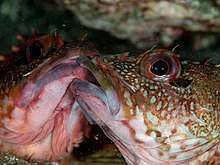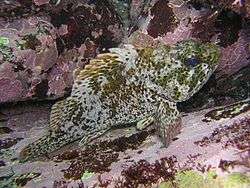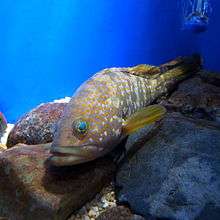Microcotyle sebastisci
Microcotyle sebastisci is a species of monogenean, parasitic on the gills of marine fish. It belongs to the family Microcotylidae.[3]
| Microcotyle sebastisci | |
|---|---|
| Scientific classification | |
| Kingdom: | Animalia |
| Phylum: | Platyhelminthes |
| Class: | Monogenea |
| Order: | Mazocraeidea |
| Family: | Microcotylidae |
| Genus: | Microcotyle |
| Species: | M. sebastisci |
| Binomial name | |
| Microcotyle sebastisci Yamaguti, 1958 | |
| Synonyms | |
Systematics
Microcotyle sebastisci was first described by Yamaguti in 1958, from mature specimens only, out of 41 specimens recovered from three Sebastidae Sebastiscus marmoratus, Sebastodes güntheri (currently Sebastes ventricosus) and Sebastichthys pachycephalus (currently Sebastes pachycephalus) and one Serranidae Epinephelus akaara .[3][4] Unnithan erected the genus Caenomicrocotyle and the subgenus Caenomicrocotyle and transferred Microcotyle sebastisci as Caenomicrocotyle (Caenomicrocotyle) sebastisci.[2] In 1972, Caballero y Caballero and Bravo-Hollis erected the genus Paramicrocotyle to describe Paramicrocotyle tampicensis and Paramicrocotyle atriobursata off Mexico and placed whithin this genus sixteen species previously assigned to the genus Microcotyle including Microcotyle sebastisci, as Paramicrocotyle sebastisci.[1][5] Mamaev, in his revision of the family Microcotylidae, considered Paramicrocotyle a junior subjective synonym of Microcotyle.[6]
Morphology
Microcotyle sebastisci has the general morphology of all species of Microcotyle, with a flattened, fusiform body with an anterior end forming a flat elevation beyond the anterior buccal suckers. The body comprises an anterior part which contains most organs and a posterior part called the haptor. The haptor is wedge-shaped, and bears 29–62 clamps(11–31 clamps on each side), arranged as two rows. The clamps of the haptor attach the animal to the gill of the fish. There are also two buccal suckersslightly smaller than the pharynx at the anterior extremity. The digestive organs include an anterior, terminal mouth, a globular pharynx, and a posterior intestine with two branches provided with irregular outer and inner branches; the right branch ends at the posterior end the body proper while the left one extends into the haptor. Each adult contains male and female reproductive organs. The reproductive organs include a reniform genital atrium, surrounded by radiating muscle fibers and covered inside with short spines except for the median anterodorsal areas, an oval to elliptical unarmed vagina opening middorsally at the anterior end, a single ovary in form of an interrogation mark, 8-20 testes that occupy the whole postovarian intercecal field. Eggs are fusiform, with a long filament at each pole.[3][2]
Etymology
The specific epithet sebastisci is derived from the generic name of the type-host Sebastiscus marmoratus.[3]
Diagnosis
According to Yamaguti, Microcotyle sebastisci is most closely related to Microcotyle tanago as indicated by the general shape of the body, and the two species can be distinguished by the presence of a prominent conical cirrus in Microcotyle sebastisci. Microcotyle sebastisci differs from Microcotyle ditrematis in the shape and organisation of the genital atrium, and the size and structure of the cirrus. Microcotyle sebastisci also resembles Microcotyle caudata and Microcotyle sebastis in the number of clamps, but they differ in the number of testes and egg size.[3]
Hosts and localities



The type-host of Microcotyle sebastisci is the False Kelpfish Sebastiscus marmoratus (Sebastidae). It was also recorded on two other Sebastidae; the rockfish Sebastodes guntheri and Sebastichthys pachycephalus[3] (currently Sebastes pachycephalus).[7] Yamaguti recorded the Hong Kong grouper Epinephelus akaara (Serranidae) as host of Microcotyle sebastisci.[3] The record of this species on the black Scorpionfish, Scorpaena porcus (Scorpaenidae) is uncertain.[4] Microcotyle sebastisci was first described from fish from the Inland Sea and Sagami Bay (Japan).[3] It was also recorded off Nagasaki[8][9] and Ōita (Japan)[10] as well as off Naples, Italy.[4]
References
- Caballero y Caballero, E., & Bravo-Hollis, M. (1972). Monogenea (van Beneden, 1858) Carus, 1863 de peces marinos del litoral Mexicano del Golfo de Mexico y del Mar Caribe.V. Revista de Biología Tropical, 20, 151–165.

- Unnithan, R. V. (1971). On the functional morphology of a new fauna of Monogenoidea on fishes from Trivandrum and environs. Part IV. Microcotylidae sensu stricto and its repartition into subsidiary taxa. American Midland Naturalist, 366–398.
- Yamaguti, Satyu (1958). "Studies on the Helminth fauna of Japan - Part 53. Trematodes of fishes, XII". Publications of the Seto Marine Biological Laboratory. 7 (1): 53–88. doi:10.5134/174599. ISSN 0037-2870.

- Ulmer, M. J., & James, H. A. (1981). Monogeneans of Marine Fishes from the Bay of Naples. Transactions of the American Microscopical Society, 100(4), 392.
- Mendoza-Franco, Edgar F.; Rosado Tun, Mariela del Carmen; Duarte Anchevida, Allan de Jesús; del Rio Rodríguez, Rodolfo E. (2018). "Morphological and molecular (28S rRNA) data of monogeneans (Platyhelminthes) infecting the gill lamellae of marine fishes in the Campeche Bank, southwest Gulf of Mexico". ZooKeys. 783: 125–161. doi:10.3897/zookeys.783.26218. ISSN 1313-2970. PMC 6160863.
- Mamaev, Y. L. (1986). The taxonomical composition of the family Microcotylidae Taschenberg, 1879 (Monogenea). Folia Parasitologica, 33, 199–206.

- FishBase: Synonym for Sebastes pachycephalus (Temminck & Schlegel, 1843)
- Hatai, K. Ogawa, S. and Tsukashima, Y. (1982). Control of Microcotyle sebastisci parasitizing the gills of cultured rockfish, Sebasticus marmoratus. Bulletin of Nagasaki Prefectural Institute of Fisheries 8: 41–46. [In Japanese with English title].
- Hatai, K. (1983). [Microcotyle diseases of false kelpfish]. Yoshoku 20(4): 1. [In Japanese]
- Fukuda, Y. (1999). Diseases of marine fishes and shellfishes cultured in Oita Prefecture diagnosed from 1980 to 1997. Bulletin of Oita Institute of Marine and Fisheries Science 2: 41–73. [In Japanese with English title].